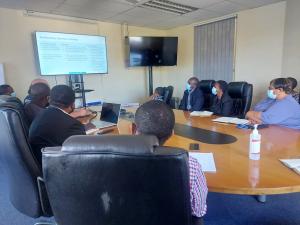Genomic surveillance assessment mission in Lesotho
Maseru – A multidisciplinary team of four experts from WHO-AFRO, the South African National Bioinformatics Institute, and the National Institute for Communicable Diseases (NICD South Africa) has arrived in Lesotho on a mission to assess the country’s readiness to launch the implementation of pathogen genomic surveillance, starting with SARS-CoV 2 genomic surveillance. This follows an earlier mission in December 2021 to conduct a countrywide situational analysis.
The mission will examine SARS-CoV-2 genomic surveillance capacities and provide technical guidance based on WHO’s recommendations notably on laboratory tools, sampling strategies and epidemiological reporting on COVID-19 indicators with joint Epi-Lab variant prevalence investigation.
“There is need for pathogen genomic sequencing currently in Lesotho as it will be a fundamental tool in contributing to relevant data for strategic response to COVID-19 in the country” – said Dr. Maile, Incident Management Systems Manager for the Ministry of Health of Lesotho. “We warmly welcome the team to Lesotho and look forward to their findings and recommendations”.
According to Dr Richard Banda, WHO Country Representative of Lesotho, “This mission forms part of WHO strategy to strengthen and accelerate genomic surveillance in the African region and worldwide”. He said, WHO’s Global genomic surveillance strategy for pathogens with pandemic and epidemic potential 2022–2032 is not specific to a single pathogen or disease threat. It offers a high-level unifying outline to leverage existing capacities.
The team of experts will also provide guidance for optimized data collection tools that capture the metadata needed for epidemiological studies within the Laboratory Information Management Systems (LIMS) and maintaining ease of use by first line healthcare providers. The team will also support the development of a national strategy for genomic surveillance.
“WHO in collaboration with Africa CDC is keen to support countries build capacity hence missions such as this enables experts to ascertain the level of technical and infrastructural capacities required” Paul Ouma, WHO AFRO Epidemiology Consultant and team lead of the mission. “This helps us to
Genomic sequencing has extensive applications including helping to identify the causes of outbreaks, better understand transmission dynamics, confirm and validate routine diagnostics, as well as innovations to produce new diagnostics, therapeutics or vaccines. Identification of different SARS-CoV 2 variants on the continent is necessitating application of bioinformatics in tracking the transmission patterns within and between different countries.
WHO together with other partners are providing member States with sequencing equipment, reagents and technical support to accelerate SARS-CoV-2 sequencing in Africa. As of March 28, 2022, approximately 98 000 Genomic sequences from Africa had been reported to the publicly available Global Initiative on Sharing All Influenza Data (GISAID) database, a repository of genomic and metadata from SARS-CoV 2 genomic surveillance.
